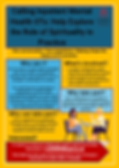This post is from a suggested group
Survey Participants Required!
📢 Hia, I’m currently completing my dissertation and I’m seeking parents whose child has had Neonatal Occupational Therapy within the last fifteen years (previously five years) to take part in a short survey.
‼️You may now be eligible as the criteria has been extended to the last fifteen years to reach a wider range of experiences and perspectives‼️
⚠️The survey is completely anonymous and shouldn’t take more than 6 to 8 minutes to complete.
🔍 The survey explores parents’ perspectives, and your input would be incredibly valuable and appreciated.
🌸 If you would be happy to take part, please click the link below:https://forms.cloud.microsoft/e/W7nP8V67kM
Thank you so much for your time and support. Please feel free to share this post with others who may be eligible 🤍
%20(dark%20background).png)

%20(dark%20background).png)















Your research on spirituality in inpatient mental health care is very intriguing. It is essential to explore how spirituality can influence the therapy process, particularly in mental health settings. The integration of spiritual care may provide a holistic approach to supporting patients' overall well-being. Best of luck with your study, and I hope it provides valuable insights for occupational therapists working in this area!